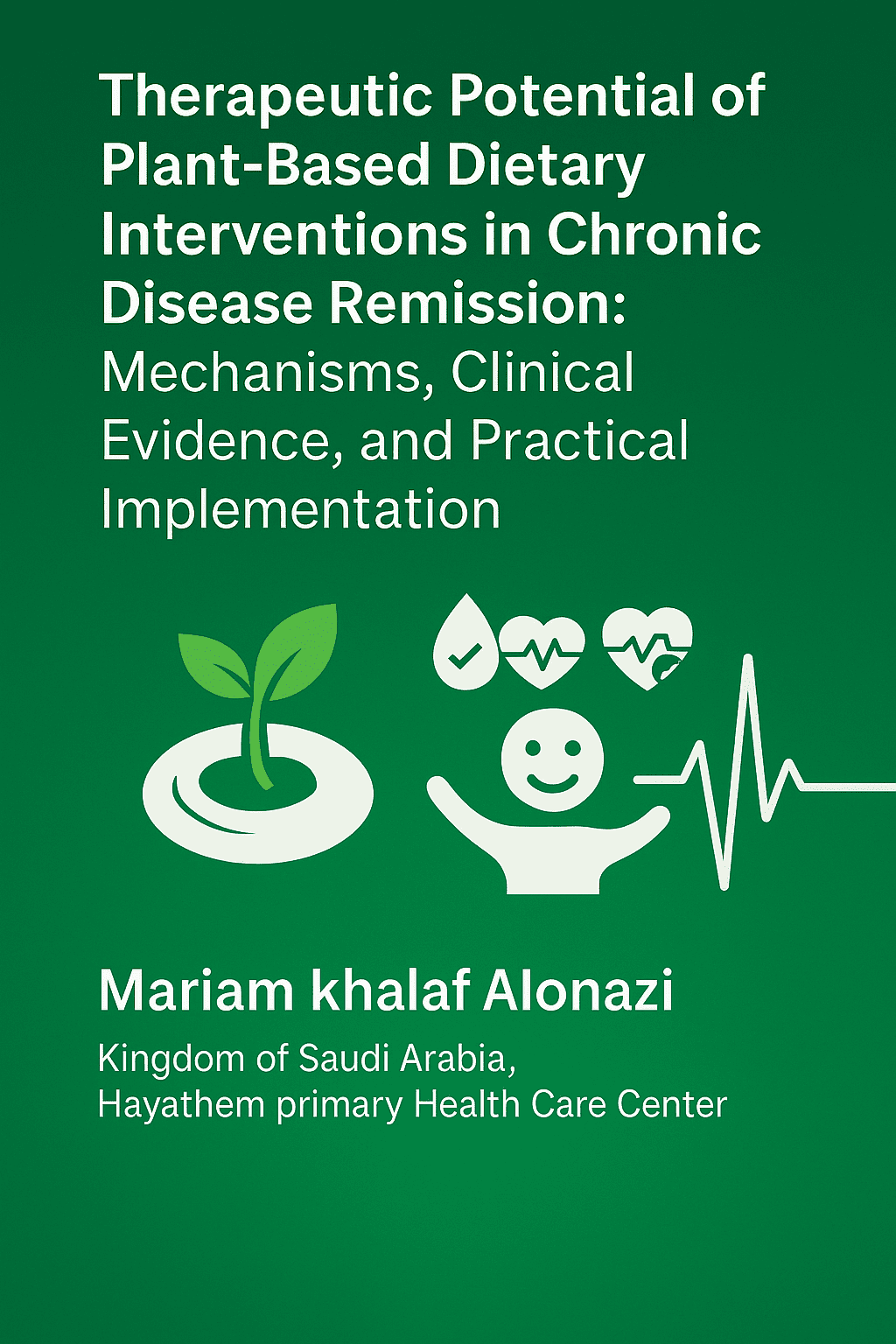Therapeutic Potential of Plant-Based Dietary Interventions in Chronic Disease Remission: Mechanisms, Clinical Evidence, and Practical Implementation
Keywords:
Plant-based diet, chronic disease, remission, type 2 diabetes, cardiovascular disease, hypertension, obesity, cancer, quality of life, cost-effective.Abstract
Background: Chronic diseases such as type 2 diabetes mellitus (T2DM), cardiovascular disease (CVD), hypertension, obesity, and certain cancers represent a large burden of morbidity and mortality worldwide, and many are affected by lifestyle including diet. Unrestricted plant-based diet (PBD), high in whole plant foods and low or no animal foods, has emerging data related to their association with prevention and reversal of chronic disease, including anti-inflammatory, anti-oxidative, and metabolic impact.
Aim: To systematically review the evidence for PBD association with remission or substantial improvement in chronic disease, including documenting clinical outcomes, quality of life (QoL), cost-effectiveness, and implementation considerations associated with any PBD.
Methods: A literature search was completed from 2000 to 2024 using keywords for plant-based diets, vegetarianism, chronic disease, and other disease-specific keywords. Eligible peer-reviewed studies included adult populations, reported clinical outcomes, QoL, and implementation considerations, with no restrictions on dietary or intervention duration. Study quality was independently assessed with the Cochrane Risk of Bias Tool and Newcastle-Ottawa Scale.
Results: Vegan diets produced beneficial clinical outcomes across a range of conditions, including type 2 diabetes (T2DM), cardiovascular disease (CVD), hypertension, obesity, and cancer progression. They improved HbA1c and LDL cholesterol and led to weight loss while preventing or reducing cancer progression. The only challenges, for example, non-adherence and insufficient nutrients, were found. The estimated annual cost savings for the recovery of T2DM and CVD management is $50-100 billion.
Conclusion: The evidence shows that PBDs can be effective at managing and possibly inducing remission in chronic diseases, and provide benefits in clinical outcomes, quality of life, and healthcare costs. The barriers to adherence, nutritional deficiencies, and scalability will need to be examined further and require education, infrastructural support, and more research to understand how best to maximize implementation.
References
Centers for Disease Control and Prevention. Health and Economic Costs of Chronic Diseases. 2023. Available from: https://www.cdc.gov.
Willett WC, et al. Food in the Anthropocene: the EAT-Lancet Commission. Lancet. 2019;393(10170):447-92.
Tuso PJ, et al. Nutritional update for physicians: plant-based diets. Perm J. 2013;17(2):61-6.
McMacken M, Shah S. A plant-based diet for the prevention and treatment of type 2 diabetes. J Geriatr Cardiol. 2017;14(5):342-54.
Tomova A, et al. The effects of vegetarian and vegan diets on gut microbiota. Front Nutr. 2019;6:47.
Anderson JW, et al. Health benefits of dietary fiber. Nutr Rev. 2009;67(4):188-205.
Tonstad S, et al. Type of vegetarian diet, body weight, and prevalence of type 2 diabetes. Diabetes Care. 2009;32(5):791-6.
Barnard ND, et al. A low-fat vegan diet and a conventional diabetes diet in the treatment of type 2 diabetes. Am J Clin Nutr. 2009;89(5):1588S-96S.
American Heart Association. Plant-based diets. 2022. Available from: https://www.heart.org.
American Diabetes Association. Nutrition recommendations and interventions for diabetes. Diabetes Care. 2008;31(Suppl 1):S61-78.
Melina V, et al. Position of the Academy of Nutrition and Dietetics: Vegetarian Diets. J Acad Nutr Diet. 2016;116(12):1970-80.
Viguiliouk E, et al. Effect of vegetarian dietary patterns on cardiometabolic risk factors in diabetes. Clin Nutr. 2019;38(3):1133-45.
Barnard ND, et al. A low-fat vegan diet improves glycemic control and cardiovascular risk factors. Diabetes Care. 2006;29(8):1777-83.
Kahleova H, et al. A plant-based diet in overweight individuals in a 16-week randomized clinical trial. Nutr Diabetes. 2018;8(1):58.
Craig WJ. Nutrition concerns and health effects of vegetarian diets. Nutr Clin Pract. 2010;25(6):613-20.
Wang F, et al. Effects of vegetarian diets on blood lipids: a systematic review and meta-analysis. Am J Clin Nutr. 2015;102(6):1342-9.
Ornish D, et al. Intensive lifestyle changes for reversal of coronary heart disease. JAMA. 1998;280(23):2001-7.
Fontana L, et al. A plant-based diet, atherogenesis, and coronary artery disease prevention. Prog Cardiovasc Dis. 2015;57(4):349-58.
Yokoyama Y, et al. Vegetarian diets and blood pressure: a meta-analysis. JAMA Intern Med. 2014;174(4):577-87.
Gibbs J, et al. Plant-based diets and cardiovascular health. Trends Cardiovasc Med. 2018;28(6):380-6.
Appel LJ, et al. Effects of protein, monounsaturated fat, and carbohydrate intake on blood pressure. JAMA. 2005;294(19):2455-64.
Satija A, et al. Plant-based dietary patterns and incidence of type 2 diabetes. PLoS Med. 2016;13(7):e1002039.
Dinu M, et al. Vegetarian, vegan diets and multiple health outcomes: a systematic review. Crit Rev Food Sci Nutr. 2017;57(17):3640-9.
Huang RY, et al. Vegetarian diets and weight reduction: a meta-analysis of randomized controlled trials. J Gen Intern Med. 2016;31(1):109-16.
Turner-McGrievy GM, et al. Comparative effectiveness of plant-based diets for weight loss. Obesity. 2015;23(2):427-34.
Wright N, et al. The BROAD study: A randomised controlled trial using a whole food plant-based diet. Nutr Diabetes. 2017;7(3):e256.
Le LT, et al. Beyond meatless, the health effects of vegan diets: findings from the Adventist cohorts. Nutrients. 2014;6(6):2131-47.
Tantamango-Bartley Y, et al. Vegetarian diets and the incidence of cancer in a low-risk population. Cancer Epidemiol Biomarkers Prev. 2013;22(2):286-94.
Ornish D, et al. Effect of comprehensive lifestyle changes on PSA in men with early-stage prostate cancer. Urol Oncol. 2008;26(5):478-84.
Key TJ, et al. Cancer in British vegetarians: updated analyses of 4998 incident cancers. Am J Clin Nutr. 2014;100(Suppl 1):378S-85S.
Katcher HI, et al. A worksite vegan nutrition program is well-accepted and improves health-related quality of life. J Am Diet Assoc. 2010;110(5):694-703.
Ferdowsian HR, Barnard ND. Effects of plant-based diets on mental health and well-being. Am J Health Promot. 2017;31(5):379-85.
Corrin T, Papadopoulos A. Understanding the attitudes and perceptions of vegetarian and plant-based diets. Appetite. 2017;108:387-94.
Clarys P, et al. Comparison of nutritional quality of the vegan, vegetarian, semi-vegetarian, pesco-vegetarian and omnivorous diet. Nutrients. 2014;6(3):1318-32.
Pawlak R, et al. How prevalent is vitamin B12 deficiency among vegetarians? Nutr Rev. 2013;71(2):110-7.
Lea EJ, et al. Public views of the barriers and facilitators to the adoption of a plant-based diet. Appetite. 2006;46(3):318-25.
Jenkins DJ, et al. Effect of a plant-based low-fat diet on inflammatory biomarkers. Nutrients. 2017;9(8):816.
Tonstad S, et al. Vegetarian diets and cardiovascular risk factors in black members of the Adventist Health Study-2. Public Health Nutr. 2015;18(3):537-45.
Tuso P, et al. A plant-based diet, atherogenesis, and coronary artery disease prevention. Perm J. 2015;19(1):62-7.
Springmann M, et al. Health and nutritional aspects of sustainable diet strategies and their association with environmental impacts. Lancet Planet Health. 2018;2(10):e451-61.
Sabaté J, Wien M. Vegetarian diets and childhood obesity prevention. Am J Clin Nutr. 2010;91(5):1525S-9S.
Poore J, Nemecek T. Reducing food’s environmental impacts through producers and consumers. Science. 2018;360(6392):987-92.
Dyett PA, et al. Vegan lifestyle behaviors: an exploration of congruence with health-related beliefs. Appetite. 2013;70:67-74.
Farmer B, et al. A vegetarian dietary pattern as a nutrient-dense approach to weight management. J Am Diet Assoc. 2011;111(6):819-27.
Greger M, Stone G. How Not to Die: Discover the Foods Scientifically Proven to Prevent and Reverse Disease. Flatiron Books; 2015.
Turner-McGrievy GM, et al. A plant-based diet for overweight and obesity prevention and treatment. J Geriatr Cardiol. 2017;14(5):369-74.
Rose D, et al. The influence of socioeconomic status on the adoption of plant-based diets. J Nutr Educ Behav. 2019;51(7):S12.
Berkow SE, Barnard N. Vegetarian diets and weight status. Nutr Rev. 2006;64(4):175-88.
Fraser GE. Vegetarian diets: what do we know of their effects on common chronic diseases? Am J Clin Nutr. 2009;89(5):1607S-12S.
Ioannidis JP. Why most published research findings are false. PLoS Med. 2005;2(8):e124.
Spencer EA, et al. Diet and body mass index in 38,000 EPIC-Oxford meat-eaters, fish-eaters, vegetarians, and vegans. Int J Obes. 2003;27(6):728-34.
Willett W, et al. Food in the Anthropocene: the EAT-Lancet Commission on healthy diets from sustainable food systems. Lancet. 2019;393(10170):447-92.
Stoll-Kleemann S, Schmidt UJ. Reducing meat consumption in developed and transition countries to counter climate change and biodiversity loss. Reg Environ Change. 2017;17(5):1261-77.
Kahleova H, et al. Cardio-metabolic benefits of plant-based diets. Nutrients. 2017;9(8):848.
Radnitz C, et al. Food choices in three ethnic groups: interactions of ideals, identities, and roles. J Cross Cult Psychol. 2013;44(2):216-41.
Hu FB. Plant-based foods and prevention of cardiovascular disease: an overview. Am J Clin Nutr. 2003;78(3):544S-51S.
Esselstyn CB Jr. Updating a 12-year experience with arrest and reversal therapy for coronary heart disease. Am J Cardiol. 1999;84(3):339-41.
Lanou AJ, Svenson C. Reduced cancer risk in vegetarians: an analysis of recent reports. Cancer Manag Res. 2010;3:1-8.
Mishra S, et al. A multicenter randomized controlled trial of a plant-based nutrition program. Eur J Clin Nutr. 2013;67(9):957-62.
Crowe FL, et al. Risk of hospitalization or death from ischemic heart disease among British vegetarians and nonvegetarians. Am J Clin Nutr. 2013;97(3):597-603.

















